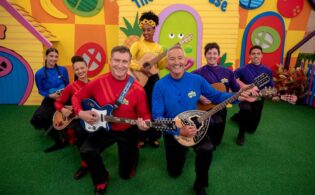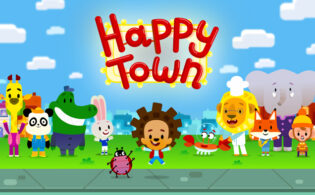Lucy Murphy, director of kids’ content for the U.K. and Ireland at Sky, highlighted her strategy for the Sky Kids linear channel and a growing on-demand lineup ahead of being recognized with the TV Kids Pioneer Award today.
Murphy’s keynote session opening the third day of the TV Kids Festival was moderated by TV Kids’ Kristin Brzoznowski. You can view it here.
Murphy’s remit covers Sky Kids, which arrived as a linear channel last year. “We talk to our customers a lot, and before launching the channel, we had been speaking to parents who were telling us that as much as they love the flexibility of on-demand viewing for their children, they found linear channels for children important. Particularly, younger families enjoyed the fact that with a linear channel, children come across new shows; they don’t binge-watch one particular show all the time. There’s variety, there are different genres they get exposed to. So much data had been leading everybody to on-demand services—and they’re great—and there is still room for linear channels.”
Partnerships with third-party channel operators are also crucial for Sky in delivering value to its subscribers, Murphy said. “We are an aggregator, from all the great free-to-airs like CBeebies and Milkshake! through to pay partners Paramount and Warner Bros. Discovery. We have eight pay channels as well as the free-to-airs. Those relationships are incredibly important because we want the very best of everything. That means the best international channels and the best British channels. Having looked at all of that, there’s also room for us to make some very targeted commissions and acquisitions at Sky Kids to complement what we get from our pay partners.”
On how the programming strategy differs across linear and on-demand, Murphy noted, “We certainly use the linear channel to introduce new shows. In this age of a very crowded environment and ‘discoverability’ being the buzzword that everybody is talking about, a linear channel gives you an opportunity to introduce a new show and create an appetite and a love for it that can then get translated into the on-demand environment. Linear also gives us an opportunity to create mood and energy, which you can’t really do on-demand in quite the same way. Our linear channel gives us the opportunity to follow the rhythm of a young child’s day. When kids are waking up, you don’t want something that’s going to get them leaping around instantly; you want something that is going to get them into the day quietly. Then you bring all your big brands in before school. We also recognize that we have different aged children available at different times of the day. We assume the bigger kids have gone off to school, so we can put on much younger-skewing programming during the middle of the day and really think about what parents need at that moment. We’re constantly thinking about what families are doing and what kids are doing. How are they feeling at this moment in time? And what can we give them that is just perfect?”
Murphy then drilled down into her commissioning strategy, with her on the lookout for shows for ages 1 to 10. “The channel is for children 7 and under. There is an amount that we commission for on-demand only, for the 6- to 10-year-old audiences. We’ve commissioned more than ever over the last couple of years, and we’re investing more than we have done before in U.K. content and creators. We’re maintaining that investment. We’re committed to commissioning for a broad demographic and all the genres that fit into what children want to watch, whether that’s news and current affairs or animation or factual entertainment.”
Acquisitions complement the third-party channel and originals lineup, Murphy said. “We try to look at where the gaps are so that we’re filling them in. We don’t have an actual number of hours per year that we take. Yes, of course, you need lots of new shows to refresh the service, but you also have to look at those shows that kids are loving and think, OK, this repeats so well, let’s take that for extra seasons. We also look for huge global brands—all the brands that you would expect from a premium entertainment service. When acquiring or commissioning, you also hope you’re going to find those little gems. A couple that we bought [recently] that have done really well for us were Beep and Mort, which came out of Australia, and Norman Picklestripes, which is a stop-motion series made in Manchester. Those little gems that are not known IP and are not big brands, but they really have blossomed and flourished.”
Murphy then weighed in on how Sky’s kids’ brands are remaining competitive amid a cost-of-living crisis and abundant media options. “We’re looking all the time at what’s going to add value for our customers, what’s going to make them feel good about paying for their subscription,” she said. “Staying competitive is about that value. It’s also about keeping one step ahead so that you stay current, relevant and, most importantly, loved. We also need to be really inclusive. Not just in the type of shows that we are commissioning, but in the experience of watching. We were delighted that we could launch the Sky Kids linear channel with 100 percent of the shows subtitled. We’ve also put a lot into subtitled collections of on-demand content because we know that it helps with kids learning to read. We’re constantly fine-tuning and finding ways to make the experience of watching amazing and for parents to think, Wow, that’s a little added extra that we get from Sky.”
Receiving the TV Kids Pioneer Award for her extensive contributions to the business, Murphy weighed in on the shifts in the industry that have most impacted how she approaches her job. “We all know that discoverability is absolutely key, and it’s top of mind for the industry. I’ve been in the industry long enough to remember a time before megabrands like PAW Patrol, Teletubbies, Peppa Pig and Hey Duggee existed. Anything coming into the market now has all that competition; all those beloved brands are going to stay. So, anything coming now has to add to that landscape and create something a little bit different.”
Murphy continued, “Also, we’re thinking a lot about the robustness of brands to be able to carry through all the digital touchpoints and real-life touchpoints that a family might have. I always say that the very best place for your show to end up is a drawing on the fridge in the kitchen. If your child has drawn, colored in and given you a picture of their favorite character, it means they love it. And if whoever is looking after that child then hangs it on the fridge, that means they also like it and have invited it into their home. We’re always really aiming for that; we’re aiming for the fridge. All of the franchise planning, which used to be pretty much TV and then consumer products, now is much more elaborate, and producers are getting brilliant at doing all of that. It’s definitely something that we think about when we’re commissioning.”
Content has to stand out, Murphy noted, and “provide an opportunity—whether that opportunity is that a child just wants to be entertained, they just want the funnies or whether they want to learn something or want to get up and dance. Whatever the need state is that they’re experiencing at that moment in time, we need to have something that fits it.”
Murphy remains energized about her work in the kids’ business, despite the challenges the sector is facing. “The creativity of this industry gets me out of bed every morning. When you see something that is just so beautiful, so heartfelt or so original, and you think, Oh, I haven’t seen that before! And the way that tech is constantly leading us into new places is exciting. Everybody’s been excited about the new LEGO-Fortnite relationship. What’s that going to look like? How’s it going to play out? We’ve been having a lot of fun with a new bit of tech called Sky Live, which is a camera that sits on top of the TV and allows for really immersive, interactive, gesture-based gameplay where you’ve got children up on their feet actually using their bodies to play games. It’s about making entertainment fit into families’ lives, and that’s exciting.”
 TVKIDS
TVKIDS






